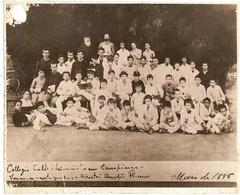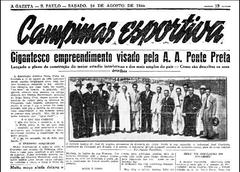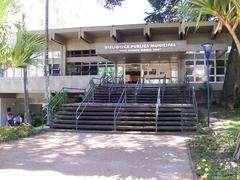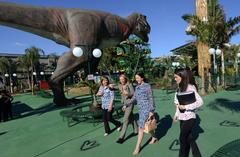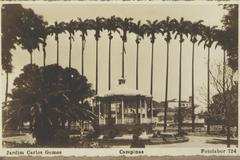
Largo do Carmo Campinas, Brazil: Visiting Hours, Tickets, and Attractions Guide
Date: 03/07/2025
Introduction
Largo do Carmo stands as the historical and cultural epicenter of Campinas, São Paulo, serving as the city’s birthplace and a vibrant symbol of its evolution. Established in the mid-18th century, the square is renowned for hosting the first Mass in 1774 and for being the site of the iconic Basílica Nossa Senhora do Carmo, inaugurated in 1781 (Wikipedia). Today, Largo do Carmo offers visitors a unique blend of religious heritage, architectural marvels, and community spirit, making it a must-visit for history enthusiasts, cultural explorers, and casual travelers alike.
This comprehensive guide provides essential information about visiting hours, ticketing, guided tours, accessibility, travel tips, and nearby attractions. Whether you’re planning a pilgrimage, a cultural immersion, or a leisurely stroll through the heart of Campinas, this article will help you make the most of your visit.
Historical Context and Significance
Origins and Early Development
Largo do Carmo is the foundational site of Campinas, with its history dating back to July 14, 1774, when the first Mass was celebrated in a provisional chapel. The square quickly became the spiritual, civic, and urban nucleus of the new settlement, leading to the establishment of the permanent Basílica Nossa Senhora do Carmo in 1781 (Wikipedia). This location served as the original parish seat and central gathering place for the burgeoning community.
Evolution and Urban Transformation
Through the centuries, Largo do Carmo has played a crucial role in Campinas’ urban development. The area is characterized by a harmonious blend of colonial, neoclassical, and baroque architectural styles. Restoration efforts have preserved these features, ensuring the square remains a living monument to the city’s past (Wikiwand).
The square’s significance grew further when, in 1889, it was officially renamed Praça Bento Quirino. Despite the official change, locals continue to affectionately refer to it as Largo do Carmo (Wikiwand).
Religious and Civic Importance
Largo do Carmo has long been the site for religious ceremonies, public festivals, political gatherings, and civic celebrations. The annual Festa de Nossa Senhora do Carmo in July attracts thousands of visitors and underscores the square’s enduring role in Campinas’ cultural life (Do in Brazil; WildTrips).
Main Attractions at Largo do Carmo
Basílica Nossa Senhora do Carmo
The basilica is the centerpiece of the square, featuring a neoclassical façade, twin bell towers, ornate altars, and beautiful stained glass windows. Inside, visitors can admire centuries-old religious art and intricate woodwork. The basilica remains a focal point for spiritual activities, community events, and classical music concerts (Trek Zone).
- Visiting Hours: Daily, 7:00 AM – 7:00 PM
- Admission: Free (donations welcome)
Carlos Gomes Monument-Tomb
In front of the basilica stands the monument-tomb dedicated to Carlos Gomes, Campinas’ most famous composer. Designed by Rodolfo Bernardelli and inaugurated in 1905, the monument is both a historical landmark and a symbol of local pride (Wikiwand).
Other Noteworthy Landmarks
- Carmo Church: Another important religious site anchoring the square’s spiritual presence.
- Colégio Bento Quirino: One of the oldest schools in the city, reflecting the area’s educational heritage.
- Jockey Club Campineiro: Historic building overlooking the square, emblematic of Campinas’ social and sporting life.
Visiting Information: Hours, Tickets, and Tours
Visiting Hours
- Largo do Carmo Square: Open 24/7 as a public space.
- Basílica Nossa Senhora do Carmo: Daily, 7:00 AM – 7:00 PM (hours may vary during special events or religious festivals).
- Other Institutions (e.g., museums): Usually open 9:00 AM – 5:00 PM; confirm with official sources for details.
Tickets and Admission
- Square and Basilica: Free entry.
- Museums/Exhibitions: Some may charge a modest fee; check ahead for prices.
Guided Tours
Guided walking tours that cover Campinas’ historic center—including Largo do Carmo—are available through local tourism offices and operators. Advance reservations are recommended during peak seasons or major festivals (Do in Brazil).
Travel Tips and Accessibility
Getting There
Largo do Carmo is centrally located and easily accessible via public transport, taxi, or ride-hailing apps. Several bus lines stop near the square, and pedestrian routes are well-marked. Parking is available in the vicinity but may be limited during busy hours or festivals.
Best Times to Visit
The dry season (May–September) offers mild temperatures and pleasant conditions for walking tours. Early mornings or late afternoons on weekdays provide a quieter experience. Major festivals, especially the Festa de Nossa Senhora do Carmo in July, attract lively crowds and offer a richer cultural experience.
Accessibility
The square and basilica have paved paths, ramps, and accessible entrances. Some historic buildings may present minor challenges due to steps or uneven surfaces, but overall, the area is accommodating for visitors with mobility needs.
Nearby Attractions
Largo do Carmo is a convenient starting point to explore Campinas’ historical core:
- Catedral Metropolitana de Campinas: Renowned for its baroque interior; a short walk away.
- Museu de Arte Contemporânea de Campinas (MACC): Showcasing modern art; nearby.
- Mercado Municipal: Famous for local produce and snacks; ideal for sampling regional flavors.
- Bosque dos Jequitibás: A large urban park perfect for relaxation and nature walks (WildTrips).
Dining, Shopping, and Amenities
Enjoy local cuisine at cafés and restaurants around the square, with specialties like pão de queijo, feijoada, and fresh pastries. Shopping options include souvenir stores, handicraft shops, and the bustling Mercado Municipal. Public restrooms and shaded benches are available for comfort.
Cultural Etiquette and Community Life
When entering the basilica, dress modestly and maintain silence during services. Photography is generally permitted in public spaces but may be restricted inside the church during ceremonies. Engaging with locals and participating in community events offers a deeper connection to Campinas’ culture.
Frequently Asked Questions (FAQ)
Q: What are the visiting hours for Largo do Carmo and the basilica?
A: The square is open 24/7; the basilica is open daily from 7:00 AM to 7:00 PM.
Q: Is there an entry fee?
A: No, entry to the square and basilica is free. Some museums may charge a small fee.
Q: Are guided tours available?
A: Yes, local tourism offices and agencies offer guided tours.
Q: Is Largo do Carmo accessible for people with disabilities?
A: Yes, most areas have ramps and paved paths.
Q: What is the best time to visit?
A: The dry season (May–September) or during the Festa de Nossa Senhora do Carmo in July.
Visual and Interactive Resources
Enhance your experience with online images, virtual tours, and interactive maps provided by Campinas’ official tourism websites. Suggested alt text for images: “Largo do Carmo Campinas Basilica façade” and “Interior stained glass windows of Largo do Carmo.”
Final Tips and Summary
Largo do Carmo is a living testament to Campinas’ history and culture, offering free access, guided tour options, and proximity to other major attractions. Attend a mass, join a festival, explore nearby museums, and savor local cuisine to fully appreciate the area’s unique atmosphere. For a seamless visit, check official sources for up-to-date information, and consider downloading the Audiala app for guided tours and real-time updates.
Useful Contacts and Resources
- Campinas Tourism Office: Multilingual assistance, maps, and guides.
- Emergency Numbers: Police (190), Medical (192), Fire (193).
- Official Tourism Sites:
VisitSights Campinas
Centro de Memória-Unicamp
Sources
- Wikipedia - Basilica of Our Lady of Carmel, Campinas
- Wikiwand - Praça Antônio Pompeu
- WildTrips - Top 10 Attractions to Visit in Campinas
- Do in Brazil - Campinas, São Paulo
- Trek Zone - Metropolitan Region of Campinas
For more detailed guides, download the Audiala app or follow us on social media for the latest updates and tips about Campinas’ historical sites.




